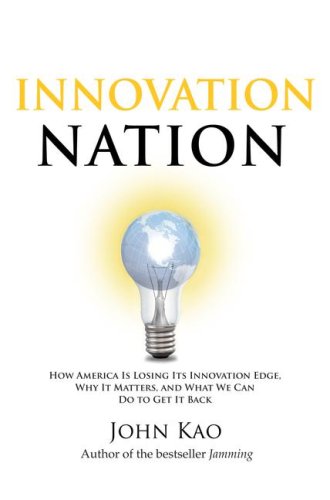On Thursday I attended the MIT Enterprise Forum's
Power, Drugs & Money Innovation Summit over at the Seaport World Trade Center. The event targeted New England entrepreneurs and focused on energy, medicine, and finance. The mid-morning panel session on the future of New England was pretty good. It consisted of a good mix of panelists including Doug Banks (Editor,
Mass High Tech),
Robert Buderi (Founder, CEO, Editor in Chief,
Xconomy),
Scott Kirsner (Innovation Economy columnist,
Boston Globe), and
Bob Krim (Executive Director,
Boston History and Innovation Collaborative). I especially loved the pot shots at Harvard for failing to encourage innovation. The premise behind that debate was that Harvard typically discourages entrepreneurism as a cop out —
 [Innovation Nation by John Kao]
[Innovation Nation by John Kao] if that's true, then I guess Harvard's desire to train business leaders ends at the Fortune 500 boardroom doors.
The highlight of the day was the opening keynote by Dr. John Kao, author of the recent book
Innovation Nation. From what I can tell his speech covered the issues in his book (I haven't read it yet, but the MITEF folks were nice enough to give me a copy). Essentially, his assertion is that America is facing a decline in innovation while other countries (like Singapore, Finland, and China) are thriving. And, many of our country's great minds are heading to these countries that are spending a lot more money on innovation and making lucrative offers to entice people. I especially appreciated the difference in his definition and the dictionary definition.
The dictionary definition:
Creativity applied to a purpose to create value.
John Kao's definition:
Capabilities that enable the continuous realization of a desired future state.
I really like that definition, It breathes life back into a word that has been massacred to the point of having no remaining meaning. And, I'm inclined to agree with his assessment of the state of innovation. The more research I do on design thinking in businesses (more to come here, and in my reports at Forrester), it's pretty clear that the vast majority of companies are focused on the bottom line, not on R&D.
—
FEEDBACK
TRACKBACKS
 [Innovation Nation by John Kao] if that's true, then I guess Harvard's desire to train business leaders ends at the Fortune 500 boardroom doors.
[Innovation Nation by John Kao] if that's true, then I guess Harvard's desire to train business leaders ends at the Fortune 500 boardroom doors.